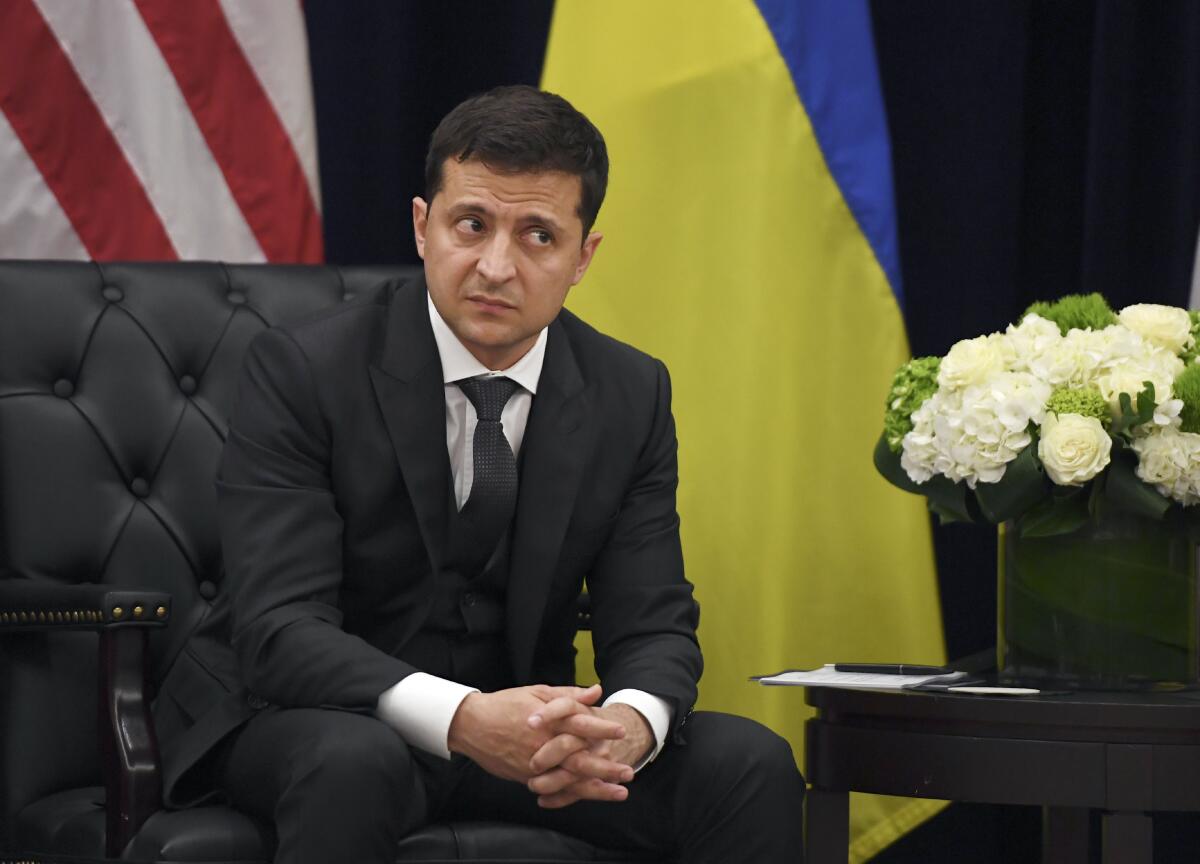Ukraine’s president, a former actor, assumes unwanted role in Trump controversy

- Share via
KYIV, Ukraine — Volodymyr Zelensky likes to call himself an “ordinary guy” — like the everyman history teacher he played on Ukrainian television. The one who became, almost by accident, his country’s president.
Zelensky’s real-world triumph in Ukraine’s presidential election in April may have pushed the boundaries of life imitating art — or, at any rate, of life imitating TV.
For the record:
12:35 p.m. Sept. 26, 2019An earlier version of this story referred to President Trump, in his conversation with President Volodymyr Zelensky, as seeking the revival of an investigation by Ukrainian authorities of former Vice President Joseph Biden and his son Hunter. Trump called for a probe to be undertaken, not revived. No past investigation has been disclosed.
But now this self-professed common man finds himself at the center of an even more extraordinary saga: President Trump’s impeachment proceedings. It’s an uncomfortable place to be.
After only a few months in office, the 41-year-old leader is still riding high in opinion polls, his domestic popularity an echo of his landslide election victory.
Critics and admirers alike, however, warn his standing could be dented if he is unable to start delivering soon on his main campaign pledges: fighting long-entrenched corruption and stemming the bloodshed in a five-year conflict with Russia-backed separatists in the country’s east — Europe’s only active battlefront.
In the meantime, Zelensky’s compatriots on Wednesday were absorbing the unsettling contents of a July 25 phone call with Trump, which has emerged as a key element in congressional Democrats’ decision to accuse the president of seeking to intimidate a foreign government into digging up dirt on a political opponent.
At the United Nations, Zelensky told Ukrainian reporters that his government had not thought his side of the conversation would be disclosed in a White House memorandum released Wednesday.
According to the White House rendering of the discussion, Zelensky compared his own improbable election triumph to that of Trump, doubtless aware that the U.S. president still enjoys basking in his 2016 victory. Although trained as a lawyer before he took up acting and comedy, the new Ukrainian leader also talked up the background in entertainment that the two men share.
He flattered Trump, who loves talking about his real estate empire, by telling him about visiting Trump Tower when he came to New York. And in repeating his commitment to the anti-corruption cause, he framed it in language favored by the U.S. president, saying he hoped to “drain the swamp.”
Echoing yet another Trump talking point during the call, Zelensky spoke slightingly of European Union aid to Ukraine, which over the past five years has totaled about $16.5 billion, some in loans and some in outright grants, to help reform efforts.
And the Ukrainian leader, sounding very much like someone speaking to a particular one-man audience, offered up some undiplomatic criticism of Europe’s two most powerful leaders, German Chancellor Angela Merkel and French President Emmanuel Macron. On Wednesday at the U.N., he quickly backtracked, praising Merkel and expressing gratitude for European assistance.
Even to Ukrainians who readily recognize the dynamic of a conversation between the leader of a small and vulnerable nation and the president of a superpower, the memorandum on the call was a disconcerting reality check.
“It is quite obvious from the tone of the conversation that Zelensky acts like a junior partner,” said independent political analyst Alexei Arestovich.
The head of a Kyiv-based consulting company, Taras Berezovets, was blunter, calling it “a conversation between a boss and servant.”
Zelensky’s reform push has been a centerpiece of his short tenure, and he has made some headway. This month, Ukrainian lawmakers voted to strip themselves of legal immunity, and another measure in the works sets rules for impeachment.
Before leaving for the United Nations, where he addressed the General Assembly on Wednesday and met with Trump, the Ukrainian leader posted an online video urging tipsters to blow the whistle on bribe-takers.
Some Ukrainians were disturbed by Zelensky’s seeming acquiescence to Trump on pursuing an investigation of former Vice President Joseph Biden and his son Hunter — pressure that congressional Democrats intend to make a primary focus of the impeachment proceedings. On the call, “Zelensky appears to succumb to manipulation,” said analyst Arestovich.
Even before the disclosure of White House accounts of the call’s contents, some who voted for Zelensky were already feeling the stirrings of disillusionment. Alexei Barkov, a restaurant owner in Kharkiv, Ukraine’s second-largest city, said he still supported the new president, but said small-business owners like him felt burdened by tighter regulatory measures recently ushered in by the new parliament.
“We who brought Zelensky to power are beginning to feel somewhat betrayed and frustrated,” he said. “We expected sweeping reforms, but what we see is just more bureaucracy, which is about to choke us.”
Others, though, give the new leader credit for helping bring about an unusual prisoner exchange with Russia. Roman Sushchenko, a Ukrainian journalist who spent more than two years imprisoned in Russia on espionage charges he denied, was grateful.
“He demonstrated that Ukraine stands by its citizens and will always protect their right to freedom and life,” he said.
Arestovich, the analyst, said many still saw Zelensky “in the mirror of their hopes.” Zelensky’s party — Servant of the People, named after the movement started by his television character — is unique in Ukraine’s history since independence in 1991 in that it has a constitutional majority in parliament and a united government.
Ultimately, his presidency will probably be measured by his handling of the separatist conflict.
Some of those who have had a close-up view of fighting wonder if the new president is naive in his peace hopes. In Zelensky’s inaugural address, he wept when talking about the conflict’s 13,000 dead.

“It is easy to say, ‘Stop shooting,’ but that can’t stop the war,” said Vladimir Semishkin, a veteran of the bloody conflict in eastern Ukraine. “If we stop shooting and retreat, they will grab more of our land and kill me and more of my friends. In the given situation we can stop the war only by killing all the bad guys.”
Zelensky, in his speech to the General Assembly, sought to make a case that Russian aggression against Ukraine posed a larger general threat than the one to his homeland.
“Nobody will feel safe while Russia is waging war against Ukraine in the center of Europe,” he told the delegates. “The thought that this has nothing to do with you, or will never touch your interests, is fatal.”
Zelensky pointedly didn’t mention Trump in his speech. But with his country set to play a starring role in Trump impeachment proceedings, he talked about mechanisms of accountability and the ways in which they can fail.
Calls for reform, he said ruefully, “must always be backed up with real actions.”
Special correspondent Loiko reported from Kyiv and Times staff writer King from Washington. Staff writer Tracy Wilkinson in New York contributed to this report.
More to Read
Sign up for Essential California
The most important California stories and recommendations in your inbox every morning.
You may occasionally receive promotional content from the Los Angeles Times.













